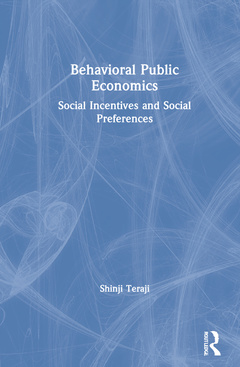Behavioral Public Economics Social Incentives and Social Preferences

Behavioral Public Economics shows how standard public economics can be improved using insights from behavioral economics. Public economics typically lists four market failures that may justify government intervention in markets?imperfect competition (or natural monopoly), externalities, public goods, and asymmetric information. Under the rational choice paradigm (?agents choose what is best for them?), public economics has examined the welfare effects of policy. Recent research in behavioral economics highlights a fifth market failure?individuals may make mistakes in pursuing their own well-being. This book calls for a rethinking of assumptions of individual behavior and provides a good foundation for public economic theory.
Key features:
- Introduces behavioral perspectives into public economics.
- Explains why economic incentives often undermine social preferences.
- Reveals that social incentives matter for public policy.
This book will be an invaluable resource for researchers and postgraduate students in public economics, behavioral economics, and public policy.
1. Introduction: Why ‘Behavioral’ Public Economics 2. Preferences, Utility, and Welfare 3. Economic Incentives in Public Economics 4. Behavioral Economics and Public Policy 5. Social Preferences and Moral Economy 6. Social Incentives and Interaction 7. Governing the Commons with Social Incentives. Bibliography
Shinji Teraji is Professor of Economics at Yamaguchi University, Japan. His research is mainly concerned with behavioral economics, institutional economics, and economic methodology.
Date de parution : 09-2021
15.6x23.4 cm
Date de parution : 09-2021
15.6x23.4 cm
Thème de Behavioral Public Economics :
Mots-clés :
public policy; moral economy; economic vs social incentives; self-regarding vs other-regarding preferences; social norms; commons; nudges; public economics; Social Welfare Function; Time Inconsistent Preferences; Bounded Rationality; Libertarian Paternalism; Correlated Equilibrium; Revealed Preference Theory; Common Pool Resources; Energy Efficiency; Ordinal Utility Theory; Tax Compliance; Tax Morale; CSR Activity; Moral Preferences; Pay For Performance; CSR Strategy; Sin Taxes; Nash Equilibrium; Expected Utility Theory; Impartial Spectator; Rational Addiction Model; Indirect Reciprocity; Behavioral Economics; Ultimatum Bargaining Game; Optimal Taxation Theory; Kirznerian Entrepreneur



